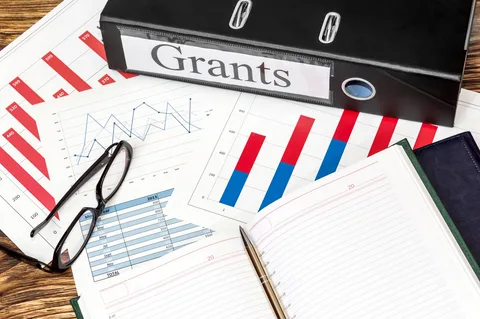In the dynamic landscape of business, staying afloat and thriving often requires a delicate balance of innovation, resilience, and, at times, financial support. For entrepreneurs and small business owners in the United Kingdom, accessing government grants can be a crucial lifeline, especially in times of economic uncertainty or when launching new ventures. In 2024, the UK government continues to offer various grants aimed at fostering growth, innovation, and sustainability across diverse sectors. However, navigating the application process can be daunting without proper guidance but a careful perusal of this article will guide you to a successful application for the UK Government Business Grants.
Eligibility Criteria for the UK Government Business Grants
In considering the eligibility of an applicant for the UK Government Business Grants, the following factors play huge roles:
1. Business Type and Size: Many government grants are targeted towards small and medium-sized enterprises (SMEs), although there may be grants available for larger businesses as well. Some grants may be specific to certain industries or sectors, while others may be more broadly applicable.
2. Location: Certain grants may be restricted to businesses operating within specific geographic regions or areas designated for economic development. Local authorities or regional development agencies may offer grants tailored to businesses within their jurisdiction.
3. Purpose of the Grant: Grants are typically offered for specific purposes, such as research and development, innovation, job creation, export promotion, environmental sustainability, or infrastructure improvement. Your business activities and the proposed use of funds must align with the objectives of the grant program.
4. Financial Viability: Some grants may require businesses to demonstrate their financial viability and sustainability. This may include providing financial statements, cash flow projections, or evidence of revenue generation.
5. Innovation and Growth Potential: Grants aimed at fostering innovation and growth may prioritize businesses with innovative products, services, or technologies. Demonstrating the potential for growth, scalability, and economic impact may enhance your eligibility for certain grants.
6. Compliance with Regulations: Businesses must comply with relevant laws, regulations, and licensing requirements. Grant applications may require proof of compliance with health and safety standards, environmental regulations, and other legal obligations.
7. Impact on the Economy or Community: Some grants may prioritize projects that have a positive impact on the local economy, create jobs, or address specific social or environmental challenges. Demonstrating the potential benefits of your project to the wider community may strengthen your application.
8. Previous Funding or Grants Received: In some cases, businesses may be ineligible for certain grants if they have already received funding from the same or similar grant programs. Grant programs may have restrictions on the number of times a business can apply or receive funding within a certain timeframe.
Note that irrespective of the criteria listed above, additional eligibility criteria may apply depending on the specific requirements of the grant program. These could include factors such as the ownership structure of the business, the number of employees, or the level of innovation.
Apply for the UK Government Business Loan.
How to apply for the UK government business grants in 2024.
Let us demystify the process and provide you with a roadmap for successfully applying for UK government business grants in 2024. Let the following steps guide you.
1. Research Available Grants
Start by researching the types of grants available. The UK government typically offers grants tailored to specific industries, such as technology, research and development, environmental sustainability, and small business growth. Websites like the UK Government’s official portal (www.gov.uk/business-finance-support-finder) can provide comprehensive lists of available grants along with eligibility criteria.
2. Understand Eligibility Criteria
Each grant will have its own set of eligibility criteria, which may include factors such as the size and nature of your business, your location, the purpose of the grant, and your plans for utilizing the funds. Carefully review these criteria to ensure your business qualifies before investing time and effort into the application process.
3. Prepare Your Business Plan
A well-thought-out business plan is essential when applying for government grants. Your plan should clearly articulate your business objectives, how you intend to use the grant funds, and how your project aligns with the goals of the grant program. Be concise, yet comprehensive, and provide realistic projections and timelines.
4. Gather Required Documentation
Most grant applications will require various supporting documents, such as financial statements, tax returns, proof of business registration, and any relevant permits or licenses. Ensure you have these documents readily available and organized to streamline the application process.
5. Complete the Application Form
Once you have gathered all necessary information and documentation, it is time to complete the application form. Pay close attention to the instructions and provide accurate and detailed responses to all questions. Double-check your entries for any errors or omissions before submitting the application.
6. Submit Your Application
After completing the application form, submit it through the designated channel as specified by the grant program guidelines. This may involve submitting the application online through a portal or mailing it to a specified address. Be mindful of any deadlines and ensure your application is submitted well before the cutoff date.
7. Follow-Up and Stay Informed
After submitting your application, it is essential to stay informed about its status. Some grant programs may provide updates or request additional information during the review process. Be responsive to any requests and follow up as necessary to demonstrate your commitment and professionalism.
8. Prepare for Compliance and Reporting
If your application is successful and you receive funding, be prepared to fulfill any compliance requirements outlined by the grant program. This may include regular reporting on the use of funds, adhering to specific project milestones, and complying with any audit or monitoring procedures.
9. Seek Professional Assistance where necessary
Applying for government grants can be complex, especially for first-time applicants or those navigating unfamiliar territory. Do not hesitate to seek assistance from professionals such as accountants, business advisors, or grant consultants who can provide guidance and support throughout the process.
